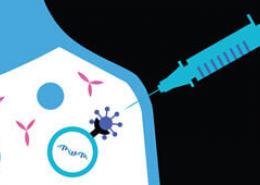Know the Mutational Status of Your Cancer: Biomarker Testing in Metastatic Melanoma and Metastatic Colorectal Cancer
MRNA VS. CONVENTIONAL VACCINES

Meet our new Chief Patient Officer, Dr. Dara Richardson-Heron

Working Together to Empower Women

Pfizer Women’s Resource Group

Universal vs. Single Payer Healthcare

If you’ve recently been diagnosed with metastatic melanoma or metastatic colorectal cancer, chances are you’ve had to familiarize yourself with a lot of new terms and complicated concepts. One term you may not have heard before is “biomarker.” As researchers learn more about how cancer cells develop, grow, and spread, more attention is being paid to the role biomarkers play in these processes. For patients, undergoing biomarker testing helps their doctor/healthcare team determine whether or not their cancer was potentially caused by a specific gene mutation.
What is a Biomarker?
A biomarker is a biological, chemical, or biophysical entity that is present in tumor tissues or body fluids.[i]It can be used to:
- Provide information on whether a disease or condition is present
- Provide information about the characteristics of a disease or condition
- Potentially provide some insight into what treatments may be appropriate for the specific type of cancer.
Mutations in Metastatic Melanoma and Metastatic Colorectal Cancer (CRC)
- There are many types of cancer biomarkers, including genetic mutations that can affect how cancer cells grow, multiply and die. In melanoma and CRC, some mutations include KRAS, NRAS, and BRAF. These mutations are typically seen in patients with metastatic disease or cancer that has spread to other parts of the body.[ii],[iii]
- The frequency of these mutations varies widely.
- KRAS is the most frequently altered gene across all cancer types, with approximately 30%-40% of CRC cases carrying a KRAS mutation.[iv]
- NRAS is the second most common oncogenic driver in melanoma and is altered in 15%-20% of melanoma patients.[v]
- The BRAF mutation is estimated to occur in approximately 50% of people with metastatic melanoma and up to 15% of people with metastatic CRC.[vi],[vii],[viii],[ix],[x],[xi],[xii],[xiii]
What is Biomarker Testing and Why is it Important?
Thanks to ongoing scientific research, doctors now know that certain cancers may be the result of mutations, or changes, that occur in certain genes, which can affect the instructions for cells to grow and divide. Biomarkers can be identified through the process of biomarker testing: a series of tests that evaluate whether cancer-causing mutations may exist.
Biomarker testing helps identify therapies that may be appropriate for a particular patient and may also provide an indication of aggressive disease or prognosis.
[i] Biomarker analysis for oncology. Future Medicines. Available at: https://www.futuremedicine.com/doi/full/10.2217/bmm.15.60. Accessed October 2020.
[ii] Vacante, M., Borzi, A., Basile, F., et al. (2018). Biomarkers in colorectal cancer: Current clinical utility and future perspectives. World Journal of Clinical Cases, 6(15), 869-881. doi: 10.12998/wjcc.v6.i15.869
[iii] Cicenas, J., Tamosaitis, L., Kvederaviciute, K., et al. (2017). KRAS, NRAS, and BRAF mutations in colorectal cancer and melanoma. Medical Oncology, 34(2), 26, doi: 10.1007/s12032-016-0879-9
[iv] Dinu, D., Dobre, M., Panaitescu, E., et al. (2014). Prognostic significance of KRAS gene mutations in colorectal cancer – preliminary study. Journal of Medicine and Life, 7(4), 581-587.
[v] Johnson, D. B., Puzanov, I. (2015). Treatment of NRAS-Mutant Melanoma. Current Treatment Options in Oncology, 16(4), 15. doi: 10.1007/s11864-015-0330-z
[vi] Saridaki, Z., Tzardi, M., Sfakianaki, M., et al. (2013). BRAFV600E Mutation Analysis in Patients with Metastatic Colorectal Cancer (mCRC) in Daily Clinical Practice: Correlations with Clinical Characteristics, and Its Impact on Patients’ Outcome. PLoS ONE, 8(12). doi:10.1371/journal.pone.0084604.
[vii] Loupakis, F., Ruzzo, A., Cremolini, C., et al. (2009). KRAS codon 61, 146 and BRAF mutations predict resistance to cetuximab plus irinotecan in KRAS codon 12 and 13 wild-type metastatic colorectal cancer. British Journal Of Cancer, 101(4), 715–721. doi:10.1038/sj.bjc.6605177.
[viii] Corcoran, R. B., Ebi, H., Turke, A. B., Coffee, et al. (2012). EGFR-mediated re-activation of MAPK signaling contributes to insensitivity of BRAF mutant colorectal cancers to RAF inhibition with vemurafenib. Cancer Discovery, 2(3), 227–235. doi:10.1158/2159-8290.CD-11-0341.
[ix] Sorbye, H., Dragomir, A., Sundström, M., et al. (2015). High BRAF Mutation Frequency and Marked Survival Differences in Subgroups According to KRAS/BRAF Mutation Status and Tumor Tissue Availability in a Prospective Population-Based Metastatic Colorectal Cancer Cohort. PloS ONE, 10(6), e0131046. doi:10.1371/journal.pone.0131046.
[x] Safaee Ardekani, G., Jafarnejad, S. M., Tan, L., et al. (2012). The prognostic value of BRAF mutation in colorectal cancer and melanoma: a systematic review and meta-analysis. PloS ONE, 7(10), e47054. doi:10.1371/journal.pone.0047054.
[xi] Vecchione, L., Gambino, V., Raaijmakers, J., et al. (2016). A Vulnerability of a Subset of Colon Cancers with Potential Clinical Utility. Cell,165(2), 317-330. doi:10.1016/j.cell.2016.02.059.
[xii] CRC in Focus. Clinical Advances in Hematology & Oncology Volume 16, Issue 5 May 2018. Available at: https://www.hematologyandoncology.net/files/2018/06/ho0518CRC-1.pdf. Accessed April 2020.
[xiii] Cheng L, Lopez-Beltran A, Massari F, MacLennan GT, Montironi R. Molecular testing for BRAF mutations to inform melanoma treatment decisions: a move toward precision medicine. Mod Pathol. 2018;31(1):24-38.Source: Read Full Article
